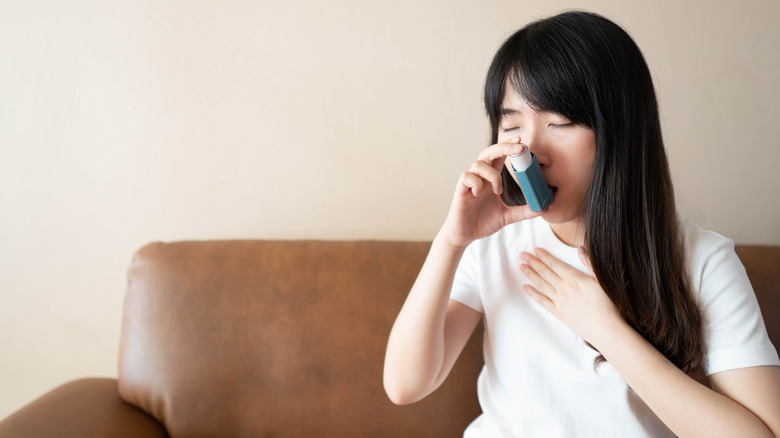The Surprising Link Between Caffeine And Asthma
According to the FDA, about 85% of Americans consume some form of caffeine every day. Caffeine works by binding to the adenosine receptors in your brain and keeping adenosine from performing its regular function, which is to slow down nerve cells to make you feel drowsy and sleepy (via How Stuff Works). When caffeine binds to those receptors, the nerve cells speed up instead and give you a boost of energy.
Many studies have been done on the effects of caffeine. A 2010 study found that drinking caffeine may help those with asthma symptoms by reducing respiratory muscle fatigue (via U.S. National Library of Medicine). Another study found that people who drink coffee every day, as opposed to tea, reported fewer asthma symptoms (via Docksci). While no concrete effect has been determined, people with asthma have a good chance of improving their symptoms by consuming caffeine regularly. The Food and Drug Administration (FDA) recommends that adults consume no more than 400 milligrams of caffeine per day to avoid negative side effects (via Medical News Today).
Side effects of caffeine
Although caffeine shows promise in treating people with asthma, you need to consume it carefully. While a moderate consumption of caffeine is considered to be generally safe, consuming too much can lead to dangerous side effects (via Medical News Today). Symptoms of too much caffeine include jitters, anxiety, increased heart rate, and depression. You may also experience nausea or headaches. People with type 2 diabetes may also see their blood pressure levels increase after consuming the stimulant.
According to Consumer Reports, it is also important to be aware of where your caffeine is coming from. This stimulant can be found in everything from coffee drinks to pre-workout to candy bars. The amount of caffeine in a product is not always clearly labeled, so it can be difficult to know exactly how much you are consuming. Pay attention to your body and stop eating or drinking anything with caffeine if you experience any negative side effects.


